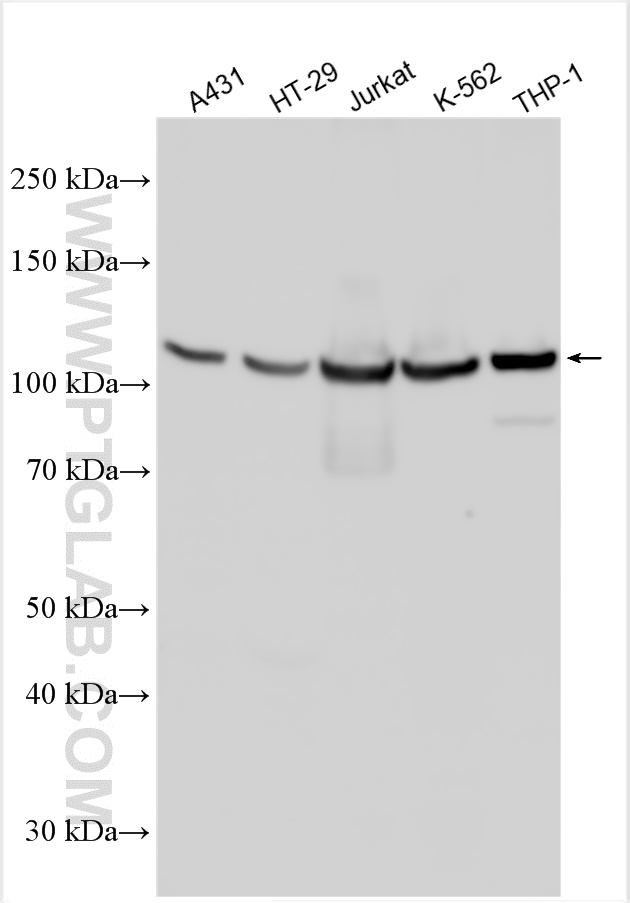验证数据展示
经过测试的应用
| Positive WB detected in | A431 cells, HT-29 cells, Jurkat cells, K-562 cells, THP-1 cells |
推荐稀释比
| 应用 | 推荐稀释比 |
|---|---|
| Western Blot (WB) | WB : 1:500-1:1000 |
| It is recommended that this reagent should be titrated in each testing system to obtain optimal results. | |
| Sample-dependent, Check data in validation data gallery. | |
产品信息
20703-1-AP targets ABCB5 in WB, ELISA applications and shows reactivity with human samples.
| 经测试应用 | WB, ELISA Application Description |
| 经测试反应性 | human |
| 免疫原 | Peptide 种属同源性预测 |
| 宿主/亚型 | Rabbit / IgG |
| 抗体类别 | Polyclonal |
| 产品类型 | Antibody |
| 全称 | ATP-binding cassette, sub-family B (MDR/TAP), member 5 |
| 别名 | P-glycoprotein ABCB5, EC:7.6.2.2, ATP-binding cassette sub-family B member 5, ABCB5beta, ABCB5alpha |
| 计算分子量 | 90 kDa |
| 观测分子量 | 90-110 kDa |
| GenBank蛋白编号 | NM_178559 |
| 基因名称 | ABCB5 |
| Gene ID (NCBI) | 340273 |
| RRID | AB_3085616 |
| 偶联类型 | Unconjugated |
| 形式 | Liquid |
| 纯化方式 | Antigen affinity purification |
| UNIPROT ID | Q2M3G0 |
| 储存缓冲液 | PBS with 0.02% sodium azide and 50% glycerol , pH 7.3 |
| 储存条件 | Store at -20°C. Stable for one year after shipment. Aliquoting is unnecessary for -20oC storage. |
背景介绍
ABCB5 is an 812 amino acid multi-pass membrane protein and belongs to the ATP-binding cassette (ABC) transporter superfamily of integral membrane proteins (PMID: 15760339). ABCB5 is an Energy-dependent efflux transporter responsible for decreased drug accumulation in multidrug-resistant cells(PMID: 15899824, 15205344). ABCB5 acts as a marker of stem-like cells (CSC) in several malignancies and is responsible for the resistance to doxorubicin of a subset of malignant melanomas (PubMed:24934811, 15760339). Alternate splicing results in multiple transcript variants.
实验方案
| Product Specific Protocols | |
|---|---|
| WB protocol for ABCB5 antibody 20703-1-AP | Download protocol |
| Standard Protocols | |
|---|---|
| Click here to view our Standard Protocols |
